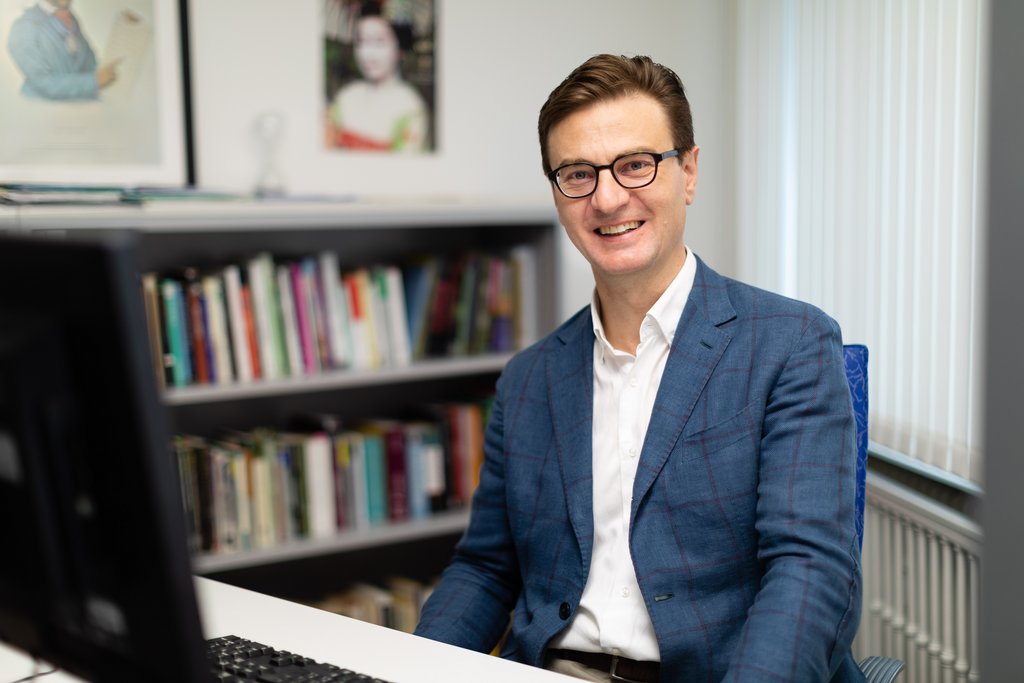Background - 12.04.2023 - 11:00
Pluriverse: The influence of philosophy on politics
HSG Philosopher Federico Luisetti talks about his invitation to speak at a G7 side event in Japan, the topic itself and what he hopes the participants will take away from his lecture. An interview.

HSG Philosopher Federico Luisetti talks about his invitation to speak at a G7 side event in Japan, the topic itself and what he hopes the participants will take away from his lecture. An interview.
It is common for HSG professors to be invited to international conferences. What is unusual in this particular case involving HSG Associate Professor and Philosopher Federico Luisetti is that he has been invited to speak at the World Economic Forum’s Agile Governance Summit, a side event of the G7 Digital and Tech Ministers’ Meeting in Japan. Summit discussions will aim to make recommendations to the G7 on governance issues. But what does a professor of philosophy have to offer business and political leaders? How does governance relate to philosophy? For more on this, we spoke with Professor Federico Luisetti.
Professor Luisetti you will be at the opening session at the World Economic Forum’s Agile Governance Summit and addressing business executives and global politicians. What will be your topic?
One of the subjects that I have researched is a concept called Pluriverse. This is a philosophical thesis that implies that the world is not just global or local but also horizontally interconnected. When we think of the planet, we should imagine a complex web of life, a plurality of related forms of existence.
The Summit has decided to organize the entire event around this notion, under the title of "Cultivating Common Sense in the Pluriverse". This is a surprising move for an organization such as the World Economic Forum, since the concept of the Pluriverse is still relatively un-know to mainstream academia and the public. It is a term that emerged in Latin America in the 1990s, in the context of the Zapatista uprising and the development of decolonial thought.
Since then, it has acquired a strong ecological connotation, pointing to the need of designing "a world where many worlds fit", a democratic planet in which humans and nature can coexist and prosper through interconnectedness. The main obstacle to achieving this goal and realizing the Pluriverse is the concentration of power in the hands of a few and the standardization of knowledge. The Pluriverse instead calls for radical plurality and the coexistence of diverse social, cultural, and economic systems.
What practical applications could this possibly have for government leaders?
The Summit will try to rethink some of the existing structures of our states and societies, applying to them an ideal of plurality. How can we re-evaluate property and technological innovation? In my view, the most pressing issues we face today at a global level are climate change and the impending ecological collapse. The Pluriverse can offer an inspiring vision to social and ecological sustainability, imagining a future in which also digital systems and governance are decentralized and brought closer to communities and their environments.
It is not a coincidence that the Japanese organizers of this event have selected the Pluriverse as a thread: the Summit will take place in Japan, a country that is highly diverse and plural: at the same time hypermodern and traditionalist, linked to global modernity and rooted in its own Asian landscape.
It doesn’t sound like the Pluriverse is a practical or tangible approach to solving global challenges. What possible influence could it have?
The idea of the Pluriverse does not offer a single solution to planetary issues, and it is skeptical about a "one-size-fits-all" approach to global problems. But it can be a way to challenge pre-conceived notions, reset priorities and suggest different perspectives on society, the environment, and politics.
What can the Summit's participants learn from an understanding of the idea of the Pluriverse?
I will take an example, something basic and universal, such as agricultural production, and ask participants to reflect on the impact the intensive cultivation of only one type of crop in a field. Environmental sciences have demonstrated that this practice has catastrophic effects: soil depletion, loss of biodiversity, the spread of diseases, the excessive use of heavy machinery and fertilizers, and the spiraling increase of carbon emissions.
I will argue that some of our social, technological, economic, and political systems are reproducing this paradigm and they have negative side effects as well. Datafication and algorithms can standardize human behaviour across continents, expand the extraction of information and natural resources, and homogenize governance models.
Can philosophy influence politics? Is it necessary?
The Pluriverse is not an abstract philosophical theory elaborated by some of the "great thinkers", or by a specific academic tradition. It is a growing, practice-based socio-ecological alternative, a new common sense that values the Earth and its human and other-than-human inhabitants.
I have always been wary of the direct influence of individual philosophers on state politics. In Italy, the last time that this happened has been with Giovanni Gentile, the "philosopher of Fascism". Gentile's theory of an "ethical state" contributed significantly to legitimizing the Italian Fascist dictatorship of Benito Mussolini. Ultimately, Gentile’s theories became a symbol of the Fascist authoritarian regime and Gentile was assassinated by Italian partisans on April 15, 1944.
It is often said that we are living in uncertain times even more specifically we are living in an age where volatility, uncertainty, complexity, and ambiguity are expected. How can critical thinking guide us and give us a foundation during these times?
My approach to sustainability is inspired by the medieval English Franciscan friar and philosopher William of Ockham. His famous methodological principle was the so called "Ockham's razor", which recommended simplicity when searching for explanations.
In the same way, I believe that we should not be overwhelmed by complexity and uncertainty, paralyzed by the proliferation of news and theories: the current planetary crisis is caused by centralized and un-democratic socio-technical systems, based on the extraction of fossil fuels and the dissemination of what the Indian environmental activist Vandana Shiva calls a "monoculture of the mind".
The Pluriverse is the name for another reality, in which plurality is real and can be nurtured by each of us with concrete actions.
Image: Federico Luisetti
More articles from the same category
Discover our special topics



![[Translate to English:] Choix Goncourt de la Suisse | unisg.ch](https://www.unisg.ch/fileadmin/_processed_/b/a/csm_Choix_Concourt_de_la_Suisse_HT-Stibi-069_2110740678.jpg)







